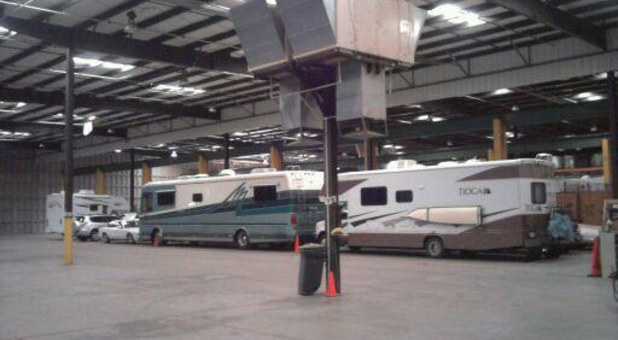RV Storage Insurance in Southern California - Exploring Your Options
—
December 9th, 2024

Owning an RV in Palm Springs is a gateway to endless adventures, but when it’s time to park your home-on-wheels for the off-season, ensuring it’s properly protected is essential. While a secure storage facility can provide safety from physical threats, adding RV storage insurance offers an extra layer of protection for your valuable investment. Whether you're guarding against theft, weather damage, or liability, understanding your insurance options is critical—especially in Southern California, where specific laws and weather patterns come into play.
Why Storage Insurance Matters for RV Owners
RVs are not just vehicles—they’re significant investments and, for many, a second home. While your existing RV or auto insurance might provide some coverage during storage, it’s often insufficient for long-term or specialized needs. This is where RV storage insurance steps in. It not only fills coverage gaps but also protects against unforeseen incidents like theft, fire, or vandalism while your RV is parked.In Palm Springs, the environment poses unique challenges.
The intense desert heat and occasional dust storms can take a toll on an RV’s exterior and interior, while flash floods, though rare, are another risk. Storage insurance ensures that these potential threats don’t translate into major financial setbacks. Moreover, many storage facilities, including ours, require proof of insurance to ensure liability coverage is in place. This protects both the facility and the RV owner, creating a win-win situation.
What You Need to Know About California Laws and RV Insurance
California law does not mandate storage-specific RV insurance, but certain regulations may still influence your coverage decisions. For example, if your RV is financed, your lender will likely require full coverage—even during storage periods. Additionally, California’s propensity for wildfires and other natural disasters makes comprehensive insurance highly advisable, as standard policies may exclude specific environmental risks.
It’s also worth noting that California law requires liability coverage for any motor vehicle, even if it’s not being driven. This means that an uninsured or underinsured RV stored at your home or in a storage facility could still pose a legal and financial risk if it causes damage or injury—for example, if it shifts and damages a neighboring RV during a windstorm.
What RV Storage Insurance Covers
RV storage insurance policies are typically tailored to the unique needs of RV owners. Comprehensive coverage includes protection against theft, vandalism, and natural disasters, while also covering personal belongings inside the RV. This is especially important for those who store items like electronics, kitchen equipment, or outdoor gear in their RV during storage.
Liability coverage, another key component, protects you in case your RV causes damage while being moved in or out of storage. For example, if an accident occurs while you’re positioning your RV at the storage facility, liability insurance ensures that any damage to others’ property or injuries are covered.
Southern California Options for RV Insurance
In Southern California, there are several well-regarded insurance providers that cater to RV owners. Progressive and Geico are popular nationwide, but they also have strong coverage options specific to California’s climate and storage needs. For those looking for RV-specific insurers, Good Sam Insurance Agency offers policies tailored to both full-time RVers and seasonal storage. Local providers like AAA Southern California and Farmers Insurance offer more localized support, which can be a bonus when dealing with claims. Additionally, Foremost Insurance and National General Insurance provide robust storage-specific options, including replacement cost coverage and protection for personal belongings.
Exploring policies from companies like State Farm, Allstate, and Safeco can also yield competitive rates and customizable plans that fit your needs.When choosing a provider, it’s crucial to read the fine print. Some policies may exclude damage from certain weather events or have specific storage requirements to maintain coverage. Be clear about what is covered and what is not to avoid unpleasant surprises down the road.
Selecting the Right Policy for Your Needs
Finding the best insurance for your RV starts with understanding your priorities. If you use your RV seasonally, look for a policy that allows you to adjust coverage levels during off-road periods. This can help lower premiums while ensuring adequate protection. For full-time RVers storing their home temporarily, policies that offer replacement cost coverage for personal belongings are essential.
While price is important, it’s not the only factor. A slightly higher premium may be worth it for a policy that offers better protection against Southern California’s specific risks, like heat and wildfire damage. Additionally, bundling your RV storage insurance with home or auto policies can often yield significant discounts.
Peace of Mind with RV Storage Insurance
Storing your RV in Palm Springs doesn’t have to be a source of stress. By investing in the right insurance, you’re protecting not only your vehicle but also your peace of mind. At our secure facility, we understand the value of your RV and encourage all our clients to explore insurance options to complement the safety measures we already have in place.
Whether you’re preparing for the sweltering summer months or looking for a long-term storage solution, securing RV storage insurance is a smart move. With providers like Progressive, Good Sam, and Farmers offering tailored plans for Southern California residents, finding a policy that fits your needs is easier than ever. For more information about our storage services or to discuss how we can help you protect your RV, contact us today. We’re here to make storing your RV safe, simple, and stress-free.
Sun Valley Storage Blog
Categories
